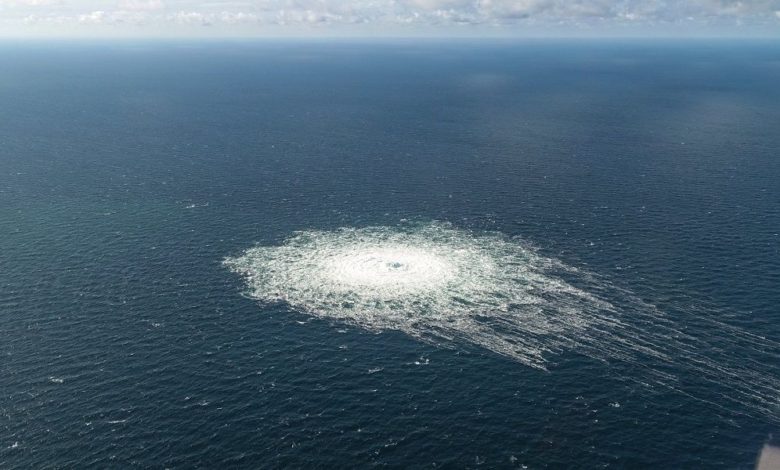
The price of European natural gas has soared on warnings of possible sabotage on the Nord Stream pipelines, deepening uncertainty about the continent’s energy security amid rising fears of running short of fuel over the winter.
European gas benchmark, the Dutch TTF, jumped more than 10% on Wednesday to approach €210/MWh after a 7% rise the day before, reversing the recent downward trend. Prices are still below this year’s peaks but remain more than 200% higher than in early September 2021.
Three separate leaks erupted from the Nord Stream 1 and 2 pipelines after seismologists reported explosions under the Baltic Sea, described by officials across Europe as a deliberate attack.
A seismograph on the Danish island of Bornholm, near where the leaks occurred, twice recorded spikes on Monday, the day on which the Nord Stream 1 and 2 gas pipelines underwent dramatic falls in pressure, the German geological research center GFZ said.
The Swedish National Seismic Network (SNSN) registered two distinct blasts in the vicinity of Bornholm, the equivalent of an earthquake magnitude of 1.8, with a second, larger blast, registering an equivalent earthquake magnitude of 2.3.
“The signals do not resemble signals from earthquakes. They do resemble the signals typically recorded from blasts,” the Geological Survey of Denmark and Greenland (GEUS) said.
Footage released by the Danish Defense Command showed a swirl of bubbling gas roughly half a mile in diameter on the surface of the Baltic Sea. Methane, the primary component of natural gas, partially dissolves in water, is not toxic, and creates no hazard when inhaled in limited quantities. Still, a five-mile exclusion zone for shipping has been set up around Bornholm, and flights below 1,000 m have been banned in the area.
European leaders and experts have raised the possibility of sabotage amid the energy standoff with Russia caused by the Ukraine conflict.
“It’s hard to imagine that it’s accidental,” Denmark’s prime minister, Mette Frederiksen, told reporters while on a trip to Poland for the opening of the Baltic Pipe – a new subsea pipeline that will carry Norwegian gas.
“We do not know the details of what happened yet, but we can clearly see that it is an act of sabotage,” Polish Prime Minister Mateusz Morawiecki told reporters Tuesday.
The act “probably marks the next stage in the escalation of this situation in Ukraine,” Morawiecki said, speaking at the Baltic Pipe opening ceremony.
German Economy Minister Robert Habeck told business leaders the leaks were due to targeted attacks on the infrastructure and Berlin now knew for sure “that they were not caused by natural occurrences or events or material fatigue.”
Meanwhile, European Commission president Ursula Von der Leyen said the leaks were due to sabotage and threatened the “strongest possible response” to any deliberate disruption of European energy infrastructure.
Amid the claims of sabotage, Russia denied responsibility for the damage. The Kremlin spokesperson, Dmitry Peskov, called the news “very concerning” and said that “no option can be ruled out right now”, including sabotage.
Before the war in Ukraine and sanctions, Russia provided more than half of all natural gas imported by Germany and more than 40% used across the European Union. Over the summer, Nord Stream 1 operated at a fraction of its capacity, while Nord Stream 2 never started.
The apparent attack had no immediate effect on European energy supplies, but the incidents will scupper any remaining expectations that Europe could receive fuel via Nord Stream 1 before winter. Repairs could take up to several months, beginning with detailed inspections of the damage before any work could begin.
“The multiple undersea leaks mean neither pipeline will likely deliver any gas to the EU over the coming winter, irrespective of political developments in the Ukraine war,” Eurasia Group wrote in a note.

Shame no-one thought of increasing nuclear, wind and solar power over the past few decades isn’t it.
Well , it was worse then that.
We did it t ourselves, closed nuclear and cool plants without asking : isn’t it dangerous to get so dependent on this wonderful country that spend the decade of the 90s killing Chechens , then in the 2000 killing Georgian ppl, invading Transnistria , 2014 Crimea, nowadays its Ukraine and Syria getting the RF freedom.
Should we have business with this people ? Germans MERKEL personal friend of Bloodmir Putin said YES , YES , YES we should and that’s how we got to this point
” closed nuclear and cool plants without asking ” Wrong.
And it wasn’t just Merkel, all countries were doing the same, thus Londongrad.